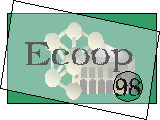
12th European Conference on Object-Oriented Programming
Brussels, Belgium, July 20 - 24, 1998
 |
12th European Conference on Object-Oriented Programming |
Workshop W15 |
| Organizers: |
Crista Lopes <lopes@parc.xerox.com> (Xerox PARC), Gregor Kiczales <Gregor@parc.xerox.com> (Xerox PARC), Bedir Tekinerdogan (University of Twente) Wolfgang De Meuter (Free University of Brussels) Marco Meijers (University of Twente) |
| Contact: |
Crista Lopes <lopes@parc.xerox.com>
Xerox PARC 3333 Coyote Hill Rd Palo Alto, CA 94304, USA |
| URL: | http://wwwtrese.cs.utwente.nl/aop-ecoop98/ |
| Day: | Tuesday |
| Room: | C303 (4th floor) |
Many systems, including object-oriented systems, have
properties that don't necessarily align with the system's functional
components, or objects. Failure handling, persistence, communication,
replication, coordination, memory management, real-time constraints,
and many others, are aspects of a system's behavior that tend to
cut-across groups of functional components, and therefore introduce
tangling in the programs.
At ECOOP'97 there was an AOP workshop that joined a number of
researchers interested in aspect-orientation. It was generally
accepted that aspect-oriented programming is a means to reduce the
problem of code tangling, therefore improving the quality of
software. The main goal of last year's workshop was to identify the
"good questions" for exploring the idea even further.
In this year's AOP workshop, we intend to discuss the questions
that were raised then, and to discuss the progress in some research
topics that emerged. Some of those topics are: aspects in the software
lifecycle, run-time and compile-time weaving, theoretical foundations
for AOP, different combinations of aspects and components, aspects and
other programming paradigms, general-purpose vs. domain- or
application-specific aspect languages, and measuring the benefits of
aspects.